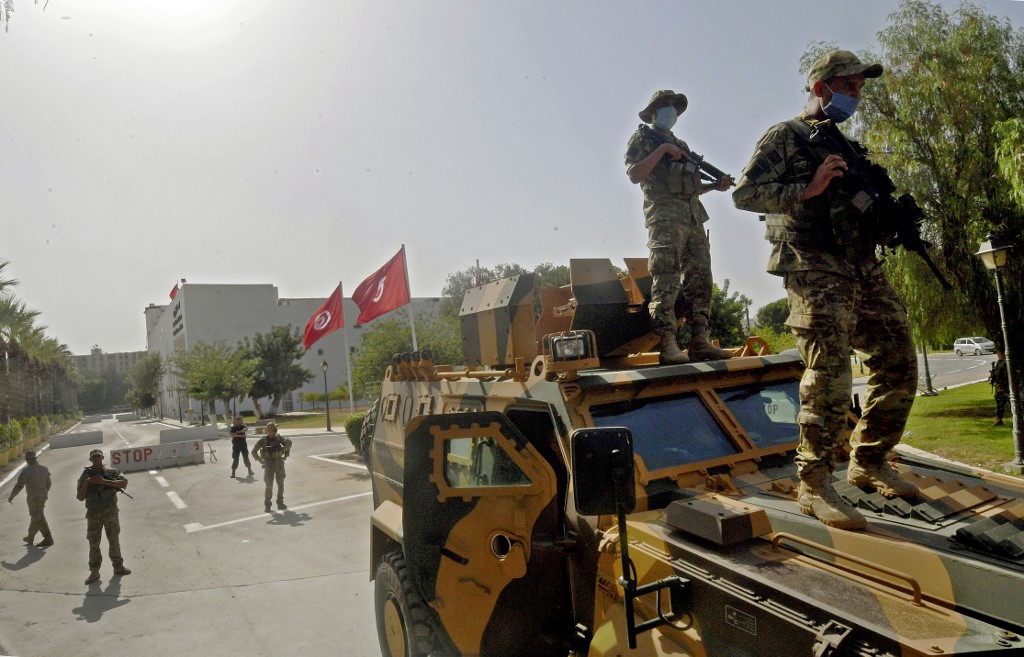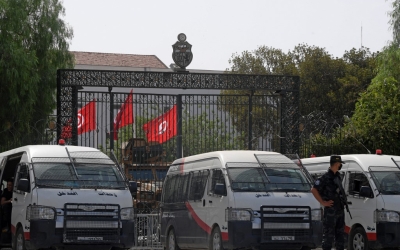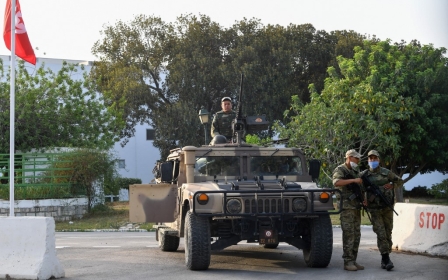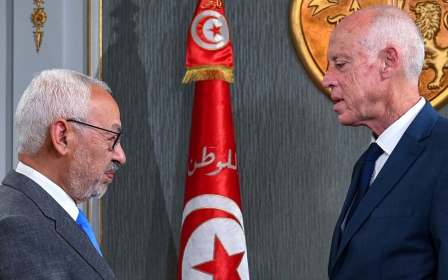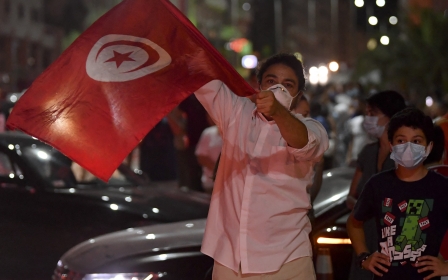Tunisia coup: Why its days could be numbered
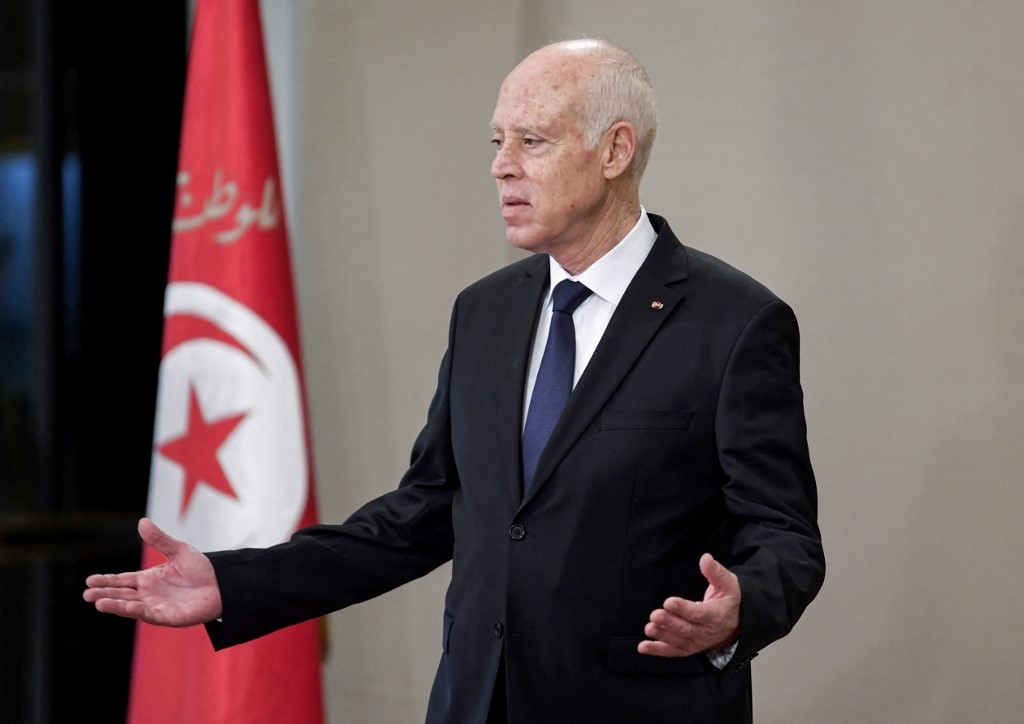
Tunisian President Kais Saied’s coup is losing momentum. He is not getting the foreign backing he needs to run the country on his own, and wider and wider circles of Tunisians at home are now realising who they have got running the state, government and judiciary.
From Saied’s point of view, neither the purges nor the appointments are going fast enough. Zuhair Maghzaoui, the secretary general of the People's Movement, a party which backs the president, proposed extending Saied's suspension of parliament for six months.
Foreign backing is important for a small country as broke as Tunisia, which can’t afford to pay its huge public sector wage bill and owes $6bn in foreign debt repayments alone this year.
It, therefore, matters what foreign stakeholders in the Tunisian economy think - and they are not telling Saied what he wants to hear.
If Saied is not listening, more and more Tunisians around him are
Ambassadors from Germany, Italy and the US have all told him to restitute parliament ASAP, according to both Tunisian and Italian sources. The Americans stopped him from holding a mass rally in favour of his power grab, informed Tunisian sources told me. They have all passed messages of support to Rached Ghannouchi, the speaker of parliament and head of Ennahda, as well as other party leaders.
New MEE newsletter: Jerusalem Dispatch
Sign up to get the latest insights and analysis on Israel-Palestine, alongside Turkey Unpacked and other MEE newsletters
While the messages delivered to Saied are private, public messages of condemnation are issued at home. US Senators Jim Rische and Bob Menendez, the ranking member and chairman of the Senate Foreign Relations Committee said they were " deeply concerned" by the growing tension and instability in Tunisia. "President Saied must recommit to the democratic principles that underpin US-Tunisia relations and the military must observe its role in a constitutional democracy. "
Saied could be tempted to ignore all this, now that he thinks he has assurances from the Emiratis and the Saudis that they will bankroll him . But before accepting these promises of Gulf money as real, he should ask the Sudanese what their experience has been.
When Omar al-Bashir was ousted as president in April 2019, Saudi Arabia and the UAE promised $3bn in aid to Sudan. Only $750m of that aid has been delivered, and none since a power-sharing deal was struck with the military in 2019. Now the Saudis have made another promise to invest $3bn in a joint fund in Sudan, while “recommitting” to the 2019 loan, of which only $300m has yet arrived.
Promises and delivery are two different things, and in the meantime, inflation in Sudan is soaring at 400 percent.
Algeria's approach
But it is the Algerian government that Saied should worry about most. Tunisia is a small country with big neighbours. Neither Egypt nor the UAE, who organised and bankrolled this coup respectively, is one of them.
Algeria started with a softly-softly approach. Algerian Foreign Minister Ramtane Lamamra flew to Tunis to deliver a “verbal message from Algerian President Abdelmadjid Tebboune”, but the contents were not made public. He also travelled to Cairo to meet Egyptian President Abdel Fattah al-Sisi, whereupon the Egyptian presidency issued the following statement: “Consensus was reached … towards full support for Tunisian President Kais Saied and everything that would maintain stability in Tunisia and implement the will and choices of the brotherly Tunisian people, in order to preserve their capabilities and the security of their country.”
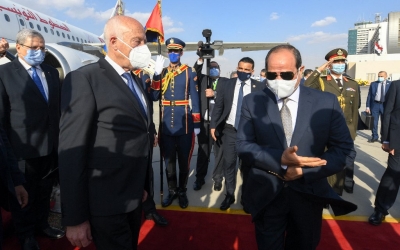
The Algerian side put out no similar statement.
When it was clear their message was not being heeded, the next Algerian official to speak was the army chief of staff, Lieutenant General Said Chengriha. He said that “conspiracies and plots that are hatched against Algeria and its people are not a figment of the imagination as some of those who cast doubt claim, but are real truth that is out there for all to see”.
A few days before, Algeria withdrew the accreditation of the Saudi owned al Arabiya TV to operate from Algeria, accusing the channel of "propagating misinformation". The general was issuing a clear warning to Saudi, the UAE and Egypt to back off.
International implications
Algeria regards Tunis as its backyard and as the gateway to Tripoli, having a clear regional stake in events in both Tunisia and Libya. Egypt, the UAE and Russia tried to impose the renegade Gaddafi-era general, Khalifa Haftar, on Libya, and Haftar’s forces got within a few kilometres of the city centre of Tripoli before being pushed back by Turkish drones. Haftar failed, and as a result, an interim administration with the backing of both east and west has been installed.
Having failed in Libya, the Emiratis are now trying to achieve the same ends in Tunisia - or at least that is how the Algerians see it. And they could be right.
A senior Algerian source told MEE: “This coup has no horizon to succeed. We demanded that Kais Saied negotiate with [Rached] Ghannouchi, and we know exactly how the Egyptians and Emiratis forced this coup through. We do not want to see another Haftar in Tunis. We do not want to see a government in Tunis which is subservient to these forces.” That is pretty clear and fairly blunt.
The Italians are also worried about Libya. Former Prime Minister Romano Prodi said that what was happening in Tunisia was not an internal issue: “The consequences of turning towards autocracy will exceed Tunisia’s borders. We, the Europeans, are losing political influence on the southern bank of the Mediterranean.”
All of this directly affects Italy, he said, not only from the increased danger of Covid-19, but also the expected waves of immigrants.
The Turkish government is also concerned about events in Tunisia, not least because of the feeling that Egypt’s and the UAE’s recent detente with Ankara could have been a ruse to distract Turkey from the real action, which was a move against Tunisia.
Turkey’s show of force in Libya was decisive. It stopped not only Haftar but the plans of all the forces that were behind him: the Russians, Emiratis, Israelis and French, all of whom at one time or another backed Hafar militarily. But could Turkey have taken its eye off the ball, which all the time was Tunisia, in the plan to keep the pressure up on Tripoli?
Not listening
Back in Tunis, however, Saied is not listening. Italian diplomats are scratching their heads. He does not understand that democracy is pluralism, and it’s not about acting as a populist leader against MPs he accuses of corruption, they complain. Indeed, he does not.
In 2019, when Saied was an outlying presidential candidate speaking out against corruption, he gave an interview in which he bluntly stated his plans. Asked to describe his electoral programme, Saied replied: “I have proposed a project [for years for] a new foundation … There has to be a new political thought and a new constitutional text.”
The unstable Saied is giving them every cause for alarm. They don't believe him, they don't trust him, and they are not backing him
Saied added that if he won the presidency, he would get rid of legislative elections, noting: “Parliamentary democracy in western countries is bankrupt, and its time is over … Look at what’s going on in France with the Yellow Vests, and in Algeria and Sudan. Parties are destined to become extinct. Their era is over … Their death may take some time, but surely in a few years, their role will end. Pluralism will become extinct by itself … We have entered a new era in history. This is the new revolution.”
The interviewer then asked him: “Is the problem with the parties or with the Tunisians who don’t read?” Saied responded: “The problem is the parties. Their role has ended.”
He also stated his clear intention to clamp down on civil society organisations in Tunisia, noting: “I have a project aimed at ending support for all societies, whether from within [Tunisia] or from outside because they are used as a means for interfering in our affairs.”
This is not a manifesto, nor is it an economic plan. Saied’s reaction to the hostility he was getting from the Biden administration was to sack his US ambassador, a man he incidentally nominated a year ago. His economic programme is to get rich tycoons to pay for poor areas. That is not a plan, and the idea is not new. His idea of monetary policy is to call on banks to cut interest rates. To be credible, this is not the president’s call to make; it is the job of the Central Bank. And as we have seen in Turkey, this is not a policy that impresses the markets.
Cause for alarm
It must also be said that Egypt, his closest ally, is not a good example. It is incomparably poorer and weaker today than when Sisi took over in a military coup in 2013. On the very day the Egyptian foreign minister met Saied to give him his full support, Sisi announced plans to cut the state subsidy on bread - the first time this had been tried since the Sadat era, when it provoked riots.
The irony of Egypt being a model for Tunisia to follow is currently encapsulated in the statistic that Egypt has a significantly higher poverty rate than Tunisia - 31 percent versus 19 percent in 2020.
If Saied is not listening, more and more Tunisians around him are - because the instability of his flakey, one-man, shoot-from-the-hip style of governance is starting to affect them as well.
His forces put the Tunisian Bar Association under siege as they sought the arrest of a lawyer. To their enormous credit, the lawyers held firm and refused to deliver Mehdi Zagrouba for arrest. The result was that the military judiciary backed off and on Monday dropped the cases against Zagrouba and four other MPs, all members of the Al-Karama Coalition in parliament.
This is not just a fight against a totalitarian populist president or an Islamist-dominated parliament. More and more, Tunisians are asking themselves where Saied is leading Tunisia.
The concerns of his neighbours around the Mediterranean are not primarily rooted in the argument between direct and representative democracy. They are concerned about Tunisia’s stability. The unstable Saied is giving them every cause for alarm. They don’t believe him, they don’t trust him, and they are not backing him. I think the days of the coup are numbered.
The views expressed in this article belong to the author and do not necessarily reflect the editorial policy of Middle East Eye.
This article is available in French on Middle East Eye French edition.
Middle East Eye delivers independent and unrivalled coverage and analysis of the Middle East, North Africa and beyond. To learn more about republishing this content and the associated fees, please fill out this form. More about MEE can be found here.



